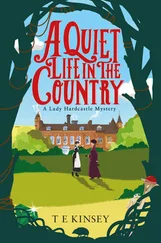‘I should call Edward, I suppose,’ said Mark. ‘He’s been going mad, wondering where she is. So’ve her parents, apparently. And her boss must be furious. I’d say she’ll be lucky to get her job back.’
‘Frankly, I’ll be sorry to lose her,’ said Pamela. ‘Martin adores her, and it’s such a trial for him chopping and changing every other day. Quite honestly’ — a tearful strain entered her voice — I don’t see how we’re going to begin to cope.’
‘Oh, it’ll be fine ,’ consoled Millie.
From my shadowy enclosure I began to hear sounds from elsewhere, a sort of scratching noise coming from further along the passage. I stood rigid as a board, not daring to move. The scratching became a scuttling, and then all at once I felt a rush of air and something jostling me about the legs. A shriek of surprise escaped my lips.
‘What on earth was that?’ said Pamela from the kitchen.
A pair of Satanic eyes glared up at me through the gloom. I heard the familiar sound of panting, the unmistakable bustle of canine chops. Roy, or his ghost, had returned to haunt me.
‘ The wind beneath the door! ’ Mark was saying in a spectral voice, while Millie trilled with appreciation.
‘Don’t you start as well,’ said Pamela. ‘My children think I’m batty enough as it is. Be a dear and go and have a look, would you? Everyone says we’re mad still leaving our doors open, but I’d hate to be barricaded in.’
I heard footsteps approaching across the kitchen floor. In a flash I had bolted silently from the ante-room and into the hall, leaving Roy — the miracle of whose resurrection I had not even had time to appreciate — behind as prime suspect for the unexplained noise. Quietly I ascended the stairs to Martin’s room and stood outside his door.
I was not relishing the thought of an encounter with Martin, even with the weighty matter of Roy off my conscience. After the incident beside the pool, I had fled back to the cottage, where I had sat in my bedroom crouched out of sight beside the wardrobe for a considerable time. Nobody had come to look for me, even after I had heard Pamela’s car pull up in the drive. The absence of a search party had lent weight to my suspicion — confirmed just now by what I had overheard from the kitchen — that Mark and Millie had given an immediate and unsparing account to Pamela of my disgrace, and that I had been outlawed from the society of the family, to be dealt with when the opportunity arose and presumably without mercy. I felt guilty nonetheless that I had been unable to fulfil my promise to Pamela of helping her with the dinner, I had considered the option of presenting myself in the kitchen with this offer as if nothing had happened, and indeed had come over to the house with that aim.
With that expiatory course of action now ruled out, however, I was forced to fall back on the harder truth; namely that my life in the country was to be brought to an abrupt conclusion, and that I was to return to London as soon as possible with few good wishes on the part of those I left behind. I will not go into my feelings concerning this prospect. You may recall the letters I wrote before my departure. I had the sensation, characteristic of the landscape of unrelieved misfortune, that I was rushing very fast downhill, as if through the blackest of tunnels; and that I could neither resist my slide nor indeed feel very much about it at all. There is something almost purifying about this type of loss of control, if one can forget that it will inevitably lead at some point to the most brutal contact with the solid ground of reality.
‘Hello,’ said Martin, when I entered the room. He was sitting in his chair reading a book.
‘Hello,’ I replied, seating myself in the leather armchair. It was almost dark now, and in the twilight Martin’s face wore an indistinct beauty of suggestion. ‘You shouldn’t read in the dark.’
‘I wasn’t reading.’
‘How was Aunt Lilian?’
‘Old. Aunt-like.’
‘When did you get back?’
‘Hour ago. Bit more.’
‘Sorry. There didn’t seem much point in coming over.’
There was a pause.
‘What happened, Stel-la?’ said Martin gravely, turning his face towards me.
I had admittedly made my apology on the assumption that news of my afternoon’s activities had reached him, but nonetheless I experienced a form of grief at hearing this assumption confirmed. I have always, ever since I was a child, disliked being in trouble, and would find the machinations of whatever authority it was I had crossed — the deadly conveyance of information, the steely privacy of consultation, the resultant efficiency of the reprimand — strangely sinister. It aroused in me a primitive fear, and even though I was not strictly afraid of the Maddens, and could indeed if pressed make a good case for not caring what they thought of me in the slightest, I felt it now.
‘I could explain it,’ I said, ‘but you wouldn’t believe me.’
‘Try.’
I remembered my investigation of the Maddens’ fridge that morning, the early and innocent misdemeanour which had subsequently cost me so much. What else had I been supposed to do, abandoned without food and with no means of procuring any?
‘I was hungry!’ I cried. My still unrelieved inanition flooded forth at the words and I sank weakly back into my chair. ‘I haven’t eaten anything all day,’ I continued, my mouth dry.
‘Why ever not?’ said Martin. ‘You don’t need to diet. You’re thin.’
‘I don’t want to be thin!’ I wailed. ‘I just don’t have any money!’
‘Well, I know it’s not much ,’ said Martin doubtfully. ‘But it certainly should be enough to—’
‘No,’ I said, closing my eyes. ‘I mean I really don’t have any. They — your parents haven’t paid me yet.’ Summoning my last reserves of energy, I explained the chain of consequence which had led from this simple omission to my discovery, drunk and unconscious, in the swimming pool.
‘Oh, I don’t think it was just that,’ said Martin, with that hint of ‘authority’ which instilled in me such terror. ‘I think they thought you weren’t — happy. ’
‘What’s that supposed to mean?’ I demanded, rallying slightly.
‘Never mind,’ said Martin. ‘Look, I’ll talk to them. See if I can sort this business out. There’s obviously been a misunderstanding. ’
‘You won’t be able to. They’ve made up their minds.’
‘How do you know?’
‘I just do.’
There was a long pause.
‘If that’s the case,’ concluded Martin with a sigh, ‘it’s probably because they think it’s for your own good, Stel-la. And they’ve got a point. They’re used to having a different sort of girl here — you know, someone from abroad who wants to learn English for a year, waifs and strays. You’ve got a life, for Heaven’s sake.’
‘But I don’t want it!’
A voice could be heard issuing faintly from downstairs.
‘Mum’s on the warpath,’ said Martin. ‘We’d better go down. It’s supposed to be Dad’s birthday dinner, after all. Come on.’
‘I can’t!’
‘Why not?’
‘I can’t face them all! Mark, and your sister, and your parents—’
‘Everyone has to face things. It’s the only way. Come on.’
We went out into the corridor, whose unilluminated gloom ushered us along, a reprimand for our lingering upstairs. I paused at the top of the stairs, while waves of conversation drifted up through the empty hall from the open door of the room below. Martin began hurriedly to shuffle down at the sound, evidently recognizing in it the call of his tribe; and for a moment I too longed to be part of this human noise, to feel the ache of singularity eased by other bodies, the strange spikes and curlicues of solitude which protruded from me like invisible horns sanded down by the gladsome, warming rub of society.
Читать дальше












